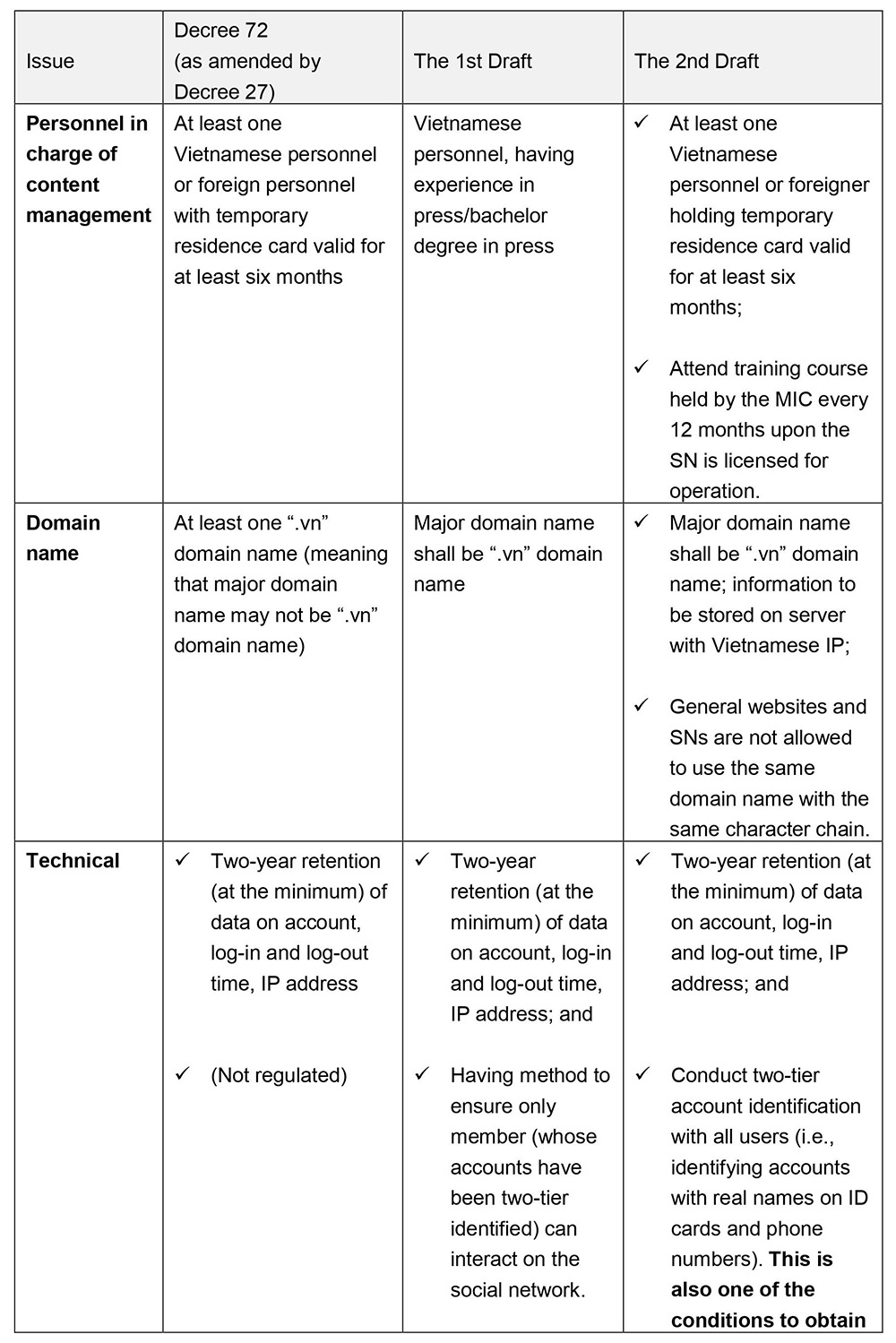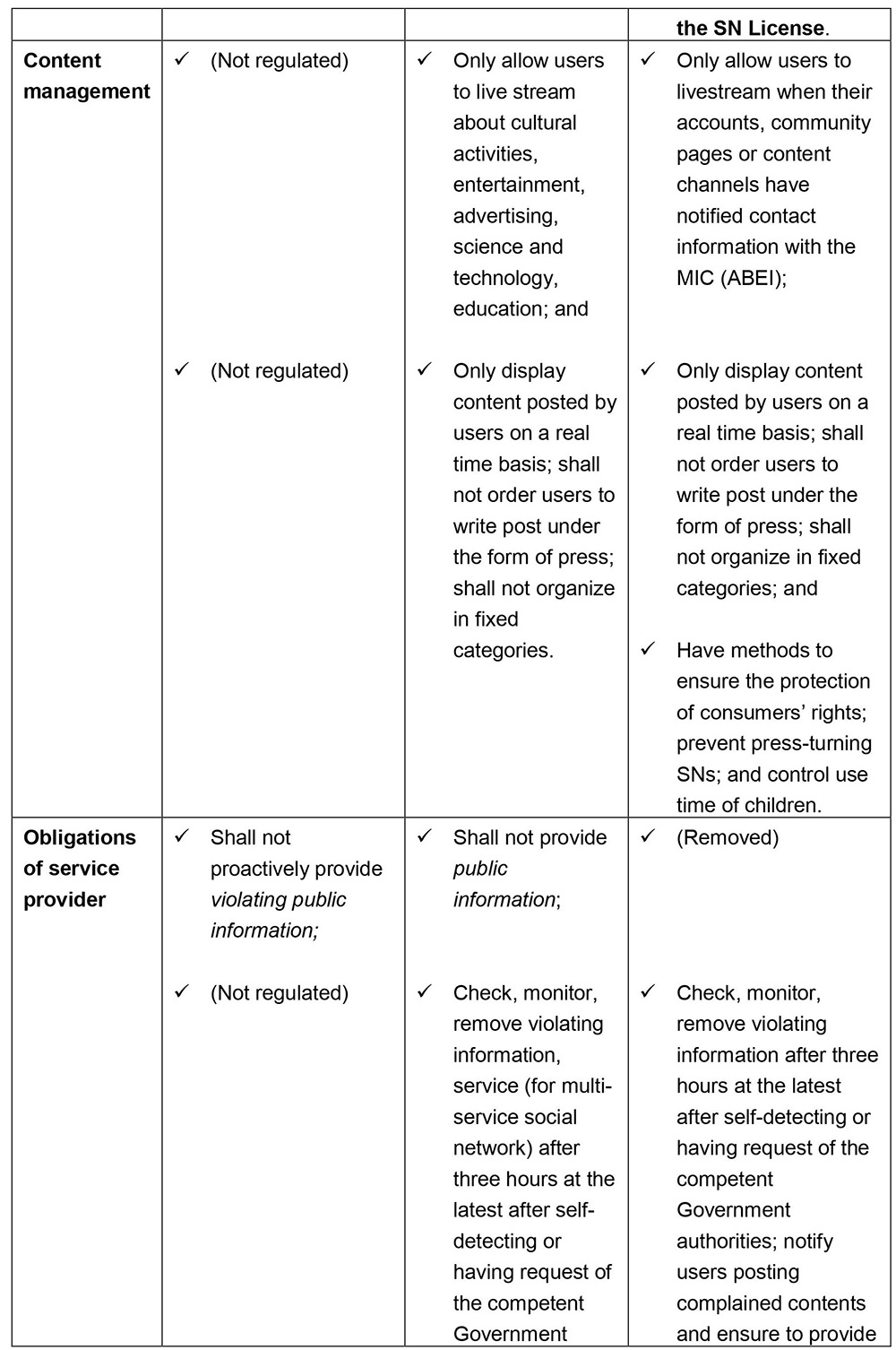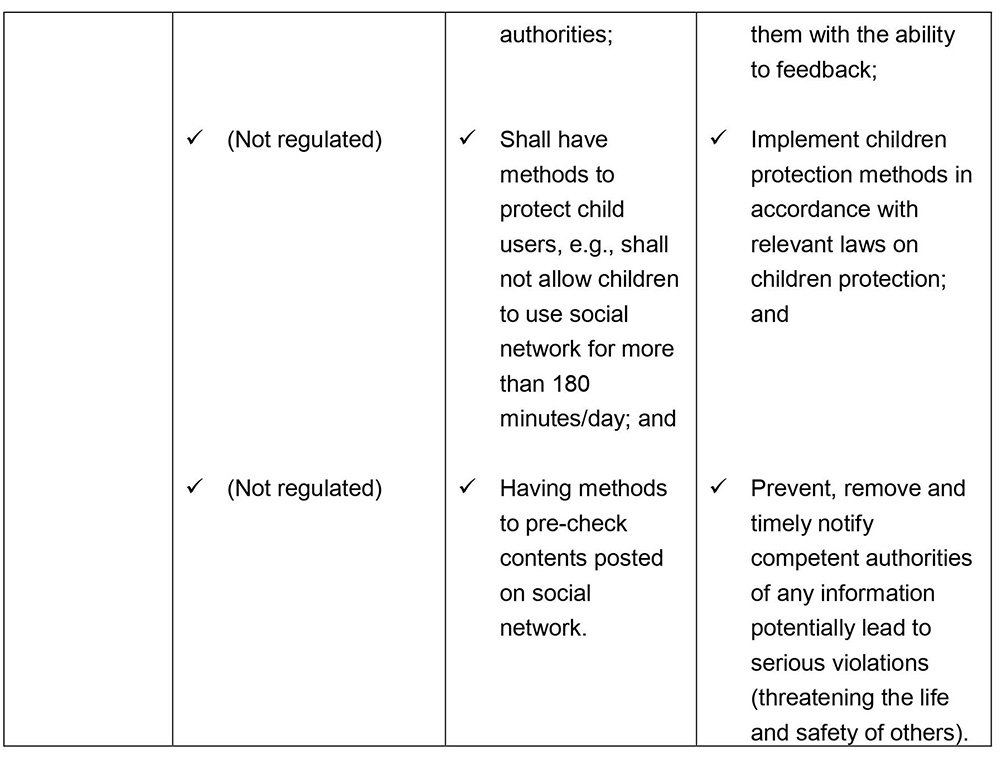![]()
Overview
This article discusses those remarkable provisions related to SNs in the 2nd Draft.
Remarkable Amendments
Definition and classification of SNs
- Definition of SNs is specified in Article 3 with some revised wording to make it more specific, which is as follow: “Social Networks are information services systems established on electronic information sites (websites) or online application platforms, providing network users community with services of information storage, provision, use, search, share and exchange, including services, features of creating accounts, content channels, personal websites (including personal blogs), forums; online chat, livestream videos; sharing sound, images; and other similar forms of services, features”.
It can be construed that in the 2nd Draft, SNs are information services systems which are based on websites or online application platforms, not information services systems in general. The forms of SNs are described in more details, which, as personally opined, may be limited in a long-term run, considering the rapid and diversified development of SNs in particular, and technology in general. - According to the 2nd Draft, SNs are majorly classified as overseas and local / domestic SNs, in which domestic SNs are further classified based on the number of access users. In particular:
(i) Overseas SNs are those cross-border provided by offshore entities (organizations and/or individuals) to Vietnam;
(ii) Domestic SNs are those provided by entities (organizations and/or enterprises only) having legal standing in Vietnam, comprising:
SNs with high Unique Visitor (the “UV”): are those having monthly UV / number of usual accesses from 10,000 visitors and above (the “High-UV SN”);
SNs with low UV: are those having monthly UV / number of usual accesses less than 10,000 visitors (the “Low-UV SN”).
It can be seen that SNs classification basing on access level is no longer applied to overseas SNs, and that regulators have removed condition on “1 million interactive users per month” from the criteria for classification, in comparison with the 1st Draft.
(iii) In addition, the novel form of SN, i.e., “multi-services SNs”, which has been brought up from the 1st Draft, are adopted in this 2nd Draft, accompanying with respective operation requirements.
Operation conditions of SNs
Depending on each type of SNs as explained above, respective applicable conditions / requirements are different.
a. Overseas SNs
Overseas SNs will be managed in accordance with Article 22 of the 2nd Draft, regulating cross-border provision of information. It is worth mentioning that regulations on cross-border provision of public information provided in Circular No. 38/2016/TT-BTTTT of the MIC dated 26 December 2016 (“Circular 38”), as incorporated in the 1st Draft, have been adopted in this Article 22 of the 2nd Draft, which applied to information in general, not just public information.
Reading further from Article 22, it is not required providers of overseas SNs to obtain the SN License, but to comply with relevant regulations of Vietnam. This does not solve the ambiguities of the previous regulations since obtaining SN License, to a certain extent, is also a regulation of the Vietnam laws.
In general, besides certain contents similar to Circular 38 and as already mentioned in the 1st Draft, some remarkable requirements applicable to overseas SNs which rent storage space in Vietnam to store digital information, or which have monthly UV from over 100,000 visitors, are as follows:
- Implement content cooperation agreements with press agencies in Vietnam when providing information quoted from Vietnamese press on the basis of copyright;
- Implement data storage and branch / representative office establishment in accordance with the Law on Cybersecurity;
- Have specialized department to: accept, handle and respond to request of local competent agencies; respond and handle complaints from Vietnamese users (within 24 hours);
- Only allow accounts, community pages and content channels in Vietnam which have notified contact information to the MIC to provide livestreams and participate in revenue-generated services;
- Publish customer support policies and procedures to handle issued regarding cyber safety and security; and
- Implement annual reports (prior to the 31st of December each year) or irregular reports upon request of Ministry of Information and Communications (the “MIC”) (Authority of Broadcasting and Electronic Information – ABEI, attached to the MIC), which can be conducted directly, via post office or electronic means.
b. Multi-services SNs
When integrating conditional specialized sectors, the 2nd Draft further requires relevant providers to obtain respective applicable licenses / eligible licenses for such respective sectors, as well as comply with specialized applicable regulations. Though it is unclear whether the such requirement is also applicable to overseas multi-services SNs, it will, as a matter of fact, bring more challenges and limitations to them due to the market access conditions applicable to foreign entities in certain conditional business sectors.
c. Domestic SNs
In order to provide SN services, the 2nd Draft requires domestic entities to obtain the License for Provision of SN Services, for High-UV SNs (the “SN License”), and to have been notified in written to competent authorities and certified by such authorities, for Low-UV SNs. However, if Low-UV SNs wish to provide livestream services, providers of such SNs are also required to obtained the SN License.
Some remarkable conditions for establishment/operation of domestic social network providers are as follows (in comparison with the original Decree 72 and the 1st Draft):



Anti-press turning SNs, children protection
- For the purpose of anti-press turning SNs, which are commonly taking place in most SNs, the 2nd Draft requires domestic SNs to have solutions for preventing their users to take advantage of SNs to conduct press activities, as specified under Article 3.2 of the Press Law.
- As for children protection, the 2nd Draft provides definitions on “children abuse acts on cyberspace”, and “information harmful for children on cyberspace”, accompanying with obligations of both overseas and domestic SNs in protecting children. Accordingly, domestic SNs, or overseas SNs cross-border provided to Vietnam and having usual access number from Vietnam of one (1) million and above, shall have the following obligations:
(i) Display warning on contents not suitable for children;
(ii) Have features to notify information harmful for children and/or children abuse acts on cyberspace;
(iii) Block / filter information harmful for children / users having children abuse acts; and
(iv) Implement age registration when registering account, and have solution to support children’s family members to monitor children’s acts when using SNs.










